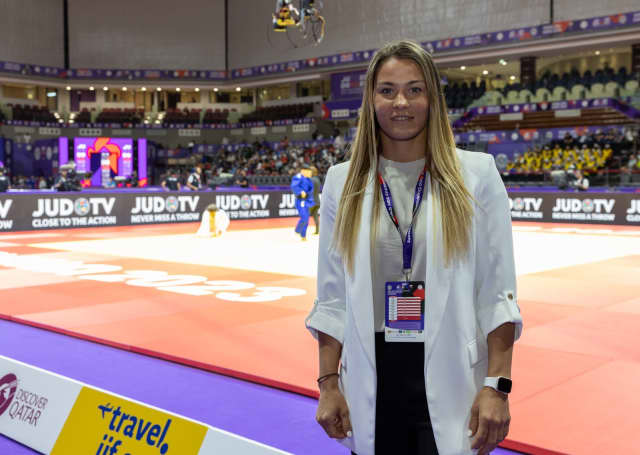“My childhood dream was to win a medal, an Olympic medal. The gold was at first important but actually through the years I realised that there are such challenges that I would be very happy to take any colour, just to win an Olympic medal; I realised that my career could be full with medals and not just with the gold and I could enjoy that.
I participated in 3 Olympic Games and so I had the chance to meet my goal but every Games was a little bit complicated for me. In London I tore my hamstring 4 weeks before fight day. I also had one ACL missing. In Rio I re-tore my ACL and after that I promised myself just to be healthy at the next one. And then Covid came.
Before Covid I felt I needed the rest but not for that long. My diet has to be very strict in order to be able to stay on top of my weight. That extra year, getting older and managing that aspect was difficult. Before competition day in Tokyo, 3 days before, I got sick. It started with a headache and during my competition day I couldn’t see clearly; I lost my peripheral vision. I don’t say it because I think it was the reason why I lost my first contest, it’s just another part of my story. You know, at the Games you have to be 100%. In this case it actually made my decision even harder, to continue or not. I had thought Tokyo would be my last Olympics but being unwell and not being able to give my best made me rethink the timeline.
I was sick for two months and even with doctors’ help I couldn’t work out why. I had worked so hard for 23 years, for that! I felt that if I finished without a medal maybe I couldn’t be happy for the rest of my life. Then I got better from the illness and I had to process that whole period and that I lost and had no medal. What should I do now? Fight for my dreams or retire or start a family or work? I felt I had to decide immediately and not take too long. I needed to do something, to make me feel better. I also felt not good enough and really didn’t know who I am if I’m not an athlete. I wanted to figure it out.
I have a sports management Bachelors degree and also an international relations and sports diplomacy post graduate qualification. The latter I did after Tokyo to help me feel that I am moving forward. I’m also a qualified coach and I took English qualifications. I continued training and competing and prepared for the Europeans, putting everything into not thinking about what to do. There was no moment left to think. I was always very tired and really it was too much but it helped me to survive. At that time I gave myself one year to finally decide, to make the choice by December 2022. I needed to live my life and do my best for a while and I felt maybe I would just know the answer by the end of that year.
I changed some things for competitions and even fought at -63kg in Antalya, Tel Aviv, Budapest and the Europeans in 2022, just to not destroy my body. For the worlds I came back to -57kg. I can’t really even say exactly why but I do like challenges.
At the end of the year I felt I should make the decision to retire. I love to train and could do judo for the rest of my life. I love to push through my limits but I knew I had to make the choice to stop and to allow myself to be ok with that. This is why it took a year, really. I had to be sure.
Now I find I can live with it and I guess the biggest reason for that is to do with my health. Before Tokyo every day was so hard, feeling tired; it wasn’t the best life. My body couldn’t accept continuing that way and I want to live the rest of my life happily and in good health.
During this period I received a few opportunities to do other things like being a coach, possible work with the IJF, working for my university. I had an offer from Mr Vizer and I felt it was a big honour and not really a question to accept or not, it was clear. So in Doha I am beginning a new role with the IJF Protocol team. I’m here to try and to learn, staying close to judo and with people and environments I understand.
I can’t know how long this chance will last or where it will go from here. This is challenging and it pushes me in a new way, it’s really huge work. The people behind the organisation do a lot, most of which isn’t seen. This is hard but I can never give up and I feel I’m growing again, day by day.
I think judo taught me this, to always survive and grow. It’s such a hard sport. It’s hard physically and mentally and on the tatami you have to fight for yourself, we really have to do it alone. As a woman it’s maybe even more important to feel that within this sport I am able to stand up for myself. The world doesn’t always lead women to be independent but through this life I am and I am confident with that.”
Hedi describes her ups and downs and they will resonate with many athletes at the latter end of their competitive careers. For now she has found her way to the next part and more importantly has found a way to gradually accept that she is enough.






